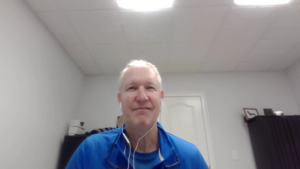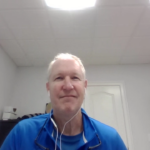Description
Bob Hudson (60) and One Small Step partner, Timothy Kocher-Hillmer (58), discuss what it was for them growing up while feeling different and uncool, yet passionate about learning. Both discuss discovering sexuality and discovering their privilege/power from two different perspectives and lifestyles. Timothy questions the misuse of power and Bob counters with a breakdown of corporate work structure/professional personalities from his experience.Subject Log / Time Code
Bob Hudson (B) asks Timothy Kocher-Hilmmer (T) what it was like growing up as a young person.
B asks T when he started to realize that he was different. T tells him he realized he was different beginning in the second grade.
T asks what school was like for him. B says he liked school, but that he was good at everything and not great at anything.
B says his life/school was mostly white and that he didn't think much of it except for when going home in separate buses from Black and brown kids. Says he thought he was at the lowest end of the totem pole but later discovered (after many years) his Black friends were worse off.
B states that, as a young person, he didn’t know what it meant to be “gay” but eventually learned in high school. Said he was only familiar with terms like “sissy boy.” Further talks about the stratification experience in high school days.
B sites his own bullying behavior as an act of finding his place in the hierarchy of high school and the world.
T asks B how he thinks power is misused in our society.
B describes the difference between power structures in big and small companies.
B describes affirmative action as a system that eventually made him retire due to the fact that he believed it forced him to make choices he did not agree with. Says the qualifications of jobs are to blame and not access.
B talks about the difference between the values that upper management holds versus the values of lower positions/employees. Noted that he worked with and is still close with a transgender employee “seven years ago before it was even a thing.” Also notes that, when bad things happen, marginalized people tend to “see their differences as the reason.
Participants
- Bob Hudson
- Timothy Kocher-Hillmer



